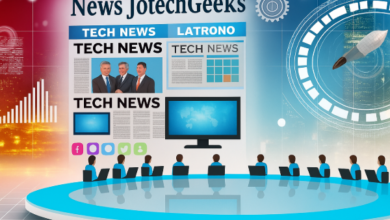Tech Innovations: Shaping the Future of Industries with Cutting-Edge Advancements
Exploring the Impact of Tech Innovations on Business, Society, and Everyday Life

Tech innovations are revolutionizing industries and reshaping everyday life. From artificial intelligence to quantum computing, these advancements are driving exponential growth in sectors like healthcare, manufacturing, and education. These cutting-edge technologies promise to solve complex global challenges, such as climate change, energy efficiency, and sustainable resource management, while creating new opportunities for economic development. As businesses and societies continue to embrace these innovations, their potential to enhance productivity, improve quality of life, and promote global connectivity is limitless.
Introduction: Understanding Tech Innovations
Tech innovations are the driving force behind much of the change we witness in the world today. These groundbreaking advancements span a broad range of industries, from robotics and artificial intelligence to renewable energy and smart cities. Essentially, tech innovations are new technologies that offer solutions to existing problems or create entirely new opportunities. As society becomes more digitally connected and increasingly reliant on technology, innovations continue to emerge, pushing the boundaries of what’s possible and shaping our future in unexpected ways.
The Rise of Artificial Intelligence and Automation
Artificial intelligence (AI) and automation are among the most prominent tech innovations that have transformed industries. AI enables machines to learn from data, make decisions, and even perform complex tasks without human intervention. In industries like manufacturing, healthcare, and logistics, automation powered by AI has increased efficiency, reduced costs, and improved precision. For example, self-driving cars, AI-powered medical diagnoses, and automated customer service systems are reshaping how businesses and consumers interact with technology.
As AI continues to evolve, it promises to enhance human capabilities, not replace them. This innovation will likely lead to a future where AI collaborates with people to solve problems faster and more efficiently.
Advancements in Healthcare Technology
Tech innovations in healthcare have already begun to transform the sector, improving patient outcomes, enhancing access to care, and optimizing the efficiency of medical practices. Innovations such as telemedicine, wearable health devices, and AI-based diagnostic tools are revolutionizing the way healthcare is delivered. Remote consultations are now possible through telemedicine, allowing patients in rural areas to access medical advice without leaving their homes. Wearable devices like fitness trackers monitor vital signs such as heart rate and blood pressure in real-time, enabling early detection of potential health issues. Furthermore, AI has the potential to drastically reduce diagnostic errors, speed up the drug discovery process, and personalize treatment plans.
Sustainable Innovations: Tech’s Role in Environmental Solutions
As climate change continues to pose global challenges, tech innovations are playing a crucial role in providing sustainable solutions. From renewable energy sources such as solar and wind power to electric vehicles (EVs) and smart grids, technology is helping reduce carbon emissions and promote sustainability. Electric vehicles, for example, are becoming more affordable and accessible, helping decrease dependence on fossil fuels. Additionally, smart grids allow for more efficient energy distribution, minimizing waste and enhancing energy conservation. Innovations in energy storage, such as advanced battery technology, are making it easier to store renewable energy for later use, ensuring that energy from renewable sources can be utilized even when the sun isn’t shining or the wind isn’t blowing.
The Future of Quantum Computing and Its Impact
Quantum computing is another revolutionary tech innovation that holds immense potential. Unlike classical computers, which process information in binary (0s and 1s), quantum computers use quantum bits (qubits) to process data in multiple states simultaneously. This allows quantum computers to solve problems much faster than traditional computers. While still in its early stages, quantum computing promises to have profound implications for industries such as cryptography, material science, and artificial intelligence. For example, quantum computing could significantly enhance the speed and accuracy of drug discovery or improve optimization in logistics and supply chain management.
How Tech Innovations Are Transforming Education
Education is another area where tech innovations are making a significant impact. Online learning platforms, virtual classrooms, and AI-based tutors are enabling students to learn at their own pace and access education from anywhere in the world. Personalized learning tools powered by AI can adapt lessons to the individual needs of students, helping them achieve better learning outcomes. Additionally, virtual reality (VR) and augmented reality (AR) are providing immersive educational experiences, allowing students to explore complex concepts in a more engaging way. For instance, medical students can use VR to simulate surgeries, while history students can visit virtual historical sites.
Business Transformation: Tech Innovations in the Corporate World
The corporate world is undergoing a transformation due to tech innovations. Businesses are increasingly relying on technologies such as cloud computing, big data analytics, and AI to streamline operations and enhance decision-making. Cloud computing has made it easier for companies to store, access, and share data remotely, enabling greater collaboration and flexibility. Big data analytics allows businesses to gain insights from vast amounts of data, driving smarter business strategies and customer experiences. AI-powered chatbots and virtual assistants are improving customer service, while automation is reducing manual labor in various industries.
The Role of 5G and Connectivity in Modern Tech
The rollout of 5G networks is one of the most significant tech innovations in recent years. 5G offers faster internet speeds, lower latency, and greater capacity, which is crucial for supporting the growing number of connected devices and data-intensive applications. This enhanced connectivity will enable innovations such as autonomous vehicles, smart cities, and the Internet of Things (IoT) to thrive. 5G will also have a significant impact on industries like healthcare, where real-time remote monitoring and telemedicine applications can benefit from faster and more reliable connections.
The Impact of Tech Innovations on Everyday Life
Tech innovations are not only transforming industries—they are also affecting how we live our daily lives. From smart home devices to wearable technology, tech is making everyday tasks more convenient and efficient. Smart thermostats, for example, learn our preferences and automatically adjust the temperature in our homes, helping us save energy. Wearable devices like smartwatches allow us to track our health, receive notifications, and even make payments with a tap of the wrist. In the future, we can expect even more seamless integration of technology into our daily routines, enhancing productivity, comfort, and overall quality of life.
Conclusion: Looking Ahead to the Future of Technology
The future of technology is bright, with endless possibilities for innovation and improvement. As tech innovations continue to evolve, we can expect more breakthroughs that will change the way we live, work, and interact with the world. AI, quantum computing, sustainable energy solutions, and advancements in healthcare will lead the charge, shaping the future of industries and society. However, it’s crucial that we also consider the ethical implications of these innovations to ensure that they are used responsibly and for the benefit of all.
In conclusion, tech innovations are at the forefront of transforming our world. By embracing these advancements and fostering a culture of innovation, we can look forward to a future that is smarter, more connected, and more sustainable. The possibilities are limitless, and the best is yet to come.



